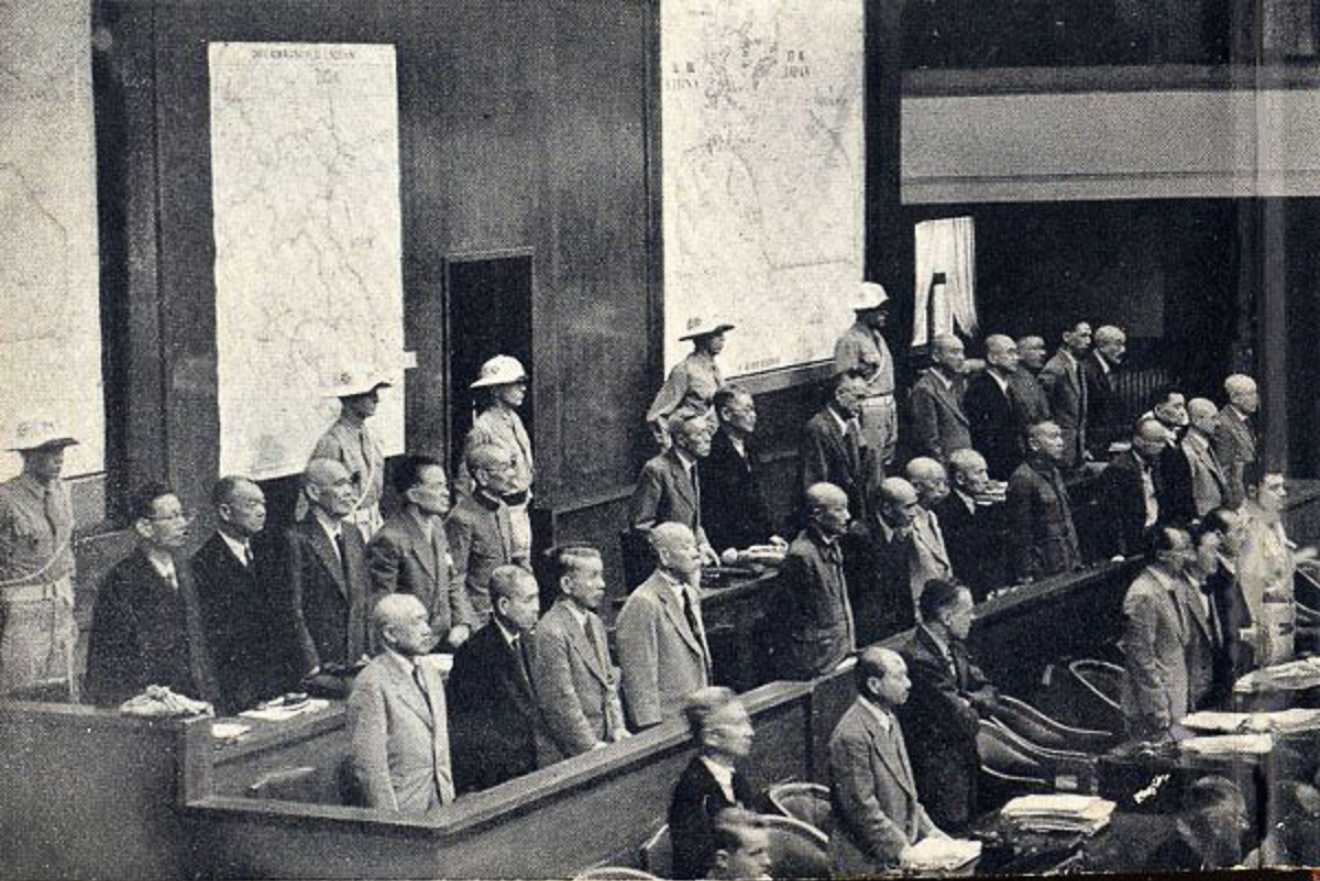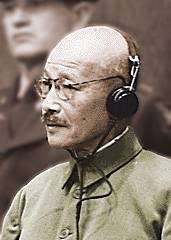[OFFICIAL] Kanto War Crimes Tribunal Day 1
 •
by
•
by William Choi

With accordance to the military law of East Korea, the Kanto War Crimes Tribunal is
hereby established to try and purge those who had deceived and misled the eJapanese
people into war.

A panal of 6 judges including Myung Kei, Joseph Orair, Stalin-chan. kim yu-na, Wladimir Rascian and William Choi has been appointed. The above judges will judge whether the defendants are gulity or innocent and sentencing war criminals.
War crimes are classified into three types, namely Class A (crimes against peace), Class B (crimes against Korean rule) and Class C (crimes against equality).


Proposed list of defendents:
name / title(s) / type(s) of crime(s) / remark
Danyeo / Prime Minister / A / Formulation and execution of a plan to wage wars of agression against eSK (1).
Chysamere / General of the Army / A / (1)
Reiji Mitsurugi / Minister of Foreign Affairs / A, B / (1), denied the legitimacy of the colonial government.
Sugawara Michizane / Minister of Health / A, B / (1), denied the legitimacy of the colonial government.
KITA Ikki / Congressman, Field Marshal / B / denied the legitimacy of the colonial government.
Tanaka Fujimori / Congressman, Field Marshal / A, B / (1), denied the legitimacy of the colonial government, offended the national pride of eSK.
Ryoushi / Field Marshal / A, B / Calling people to fight against resistance forces in Gyeongsangbuk-do.
Vai Siv / Congressman, Field Marshal / B / Calling people to fight against resistance forces in Gyeongsangbuk-do.
Goku Jones / Congresman, Field Marshal / A / (1)
TheReverendSeanV / self-proclaimed Governor General of Korea, Field Marshal / A, B, C / (1), brutally offended the sovereignty and national pride of eSK. Regarding eSK as a nation inferior to former eJapan.

The Tenno and the royal family will be excused for ALL criminal charges so as to avoid a profoundly distorting impact on Japanese understanding of the colonial government.
In the next 24 hours, judges and citizens may propose other people believed to have convicted war crimes, with suitable reasons, including the crimes convicted.
After the final list of defendents has been passed by the panal of judges, the trial will begin on the following day, which defendants will have 24 hours to convince the judges that they are innocent.



Comments
Please leave your message here within 24 hours if you would like to prosecute other people for war crimes, with suitable reasons. Thanks a lot.
I want to be prosecuted coz I’ve fought against the resistence 😃
Wow, as Minister of Defense, I wasn't even accused. I see the Korean Justice system is deeply flawed and corrupt.
As you wish, Valkyrjur. Yet, whether or not you are guilty will be determined by the judges.
Dokomo: LOL
Are you nominating yourself too? hehehe
The list above is not yet finalised and I assure you all that Dokomo will be added to the list.
That doesn't excuse the fact that you skipped me to start. How should I have any faith in the fairness and legitimacy of your tribunal when it is blind to the crimes of people until those people remind the tribunal that they are, in fact, pretty darn evil.
OMG I’m rather scared, I don't want me to end up in the electric chair 🙁
Dokomo: I assure you that you will receive a fair trial.
Valkyrjur: electric chair is not the only death penalty, if sentenced to death, firing by squad or hanging will be a better option. Electric chair is just environmentally unfriendly as it requires much electricity.
SIGN ME UP
TIE ME DOWN AND WHIP ME
I WANT TO BE PUNISHED
I'VE BEEN REALLY BAD
I've been a bad and naughty boy. Please punish me too.
What are your reasons, Kaigefoh & Daeish?
state precisely the crime(s) you have committed.
Here's a complete list of mine:
Main Entry: naughty
Part of Speech: adjective
Definition: bad, misbehaved
Synonyms: annoying, badly behaved, contrary, disobedient, disorderly, evil, exasperating, fiendish, fractious, froward, headstrong, impish, indecorous, insubordinate, intractable, mischievous, obstreperous, perverse, playful, rascally, raunchy, recalcitrant, refractory, rough, rowdy, sinful, teasing, tough, ungovernable, unmanageable, unruly, wanton, wayward, wicked, willful, worthless, wrong
If I agree to stop the war, can you give me a cookie? I'll testify against the other bad peoples :3
In the mean time I humbly accept any delicious pie.
Kaigefoh has written some pretty good articles lately about how to fight. Add that to his list!
Kaigefoh will be added to the list, thanks KITA.
danyeo: If you testify against the other bad people you will receive a more lenient sentence.
You forgot a few:
Sugawara Michizane, our Minister of Health helped heal our soldiers before and after battle.
exReality, the ambassador to eSouth Korea and our Minister of Security for failing to prevent this war from breaking out.
Oligagnon, for helping generate the gold necessary for this war.
And special thanks to all the Japanese citizens and our friends from abroad who rallied behind this war.
Oh woops, this isn't an acceptance speech is it. I'll try again later 😕
Unfortunately Daeish will not be prosecuted unless there is a sound reason.
Only leaders of the government or the army are to be prosecuted. Soldiers who fight against eSK by the order of former eJapan will be excused.
You forgot to add that I'm part of the Japanese Royal Family, only second to that of the Emperor's.
me too, i did fight against the failed resistance🙂 that means we should have a war tribunal where to accuse so called "heroes"? Those we want to deny eSK the chance to live under eJapan rule.
lolwtf is this.
I plead not guilty on the grounds that I've never denied anything.
DO the punishment include any 18+ years girls? Too many are rushing to get punished. something is not quite right.. so please put me too in that list.
motanel: as I have said, only leaders of the government or the army are to be prosecuted. Soldiers who fought against eSK by the order of former eJapan will be excused.
exReality: Do you have any proof of your identity as a member of the royal family?
motanel: unless you have a sound reason, you will NOT be included into the list.
I demand to be on this list as a traitor to the eSouth Korean government because eJapan is awesomer.
Check your forums. I'm on them.
you're mean... i want to be punished. 🙁
Nowe: Sure, you will be charged for treason. Though, whether or not you are guilty depends on the judges.
Awesome. I suddenly feel important!
how about i bought my own weapons and also distribute few to other citizen who fought against eSK? i'm an arm dealer. can i be on that list. please?
exReality: Any proof to justify your testimony?
Yeah. His Majesty baptized me; when I was a mere citizen of the Glorious Empire.
motanel: Only leaders of the government or army and traitors will be prosecuted. Unfortunately, you are none of them 😞
Proof: I am now the Minister of Security; Ambassador to South Korea; Chairman of the biggest Party in Japan. This could not have been accomplished without the grace of His Majesty.
Oh oh I know! I can get punished! I am in congress and voted to approve the declaration of war.
I'm even in congress from the region of Jeju (which means, West Japan approved this war. Hah)
Haha u sux @ motanel.
U SHULD HAV BEEN TRAITOR
exReality: Having the grace of the Tenno does not mean you are a member of his family.
exReality and Myung_Kei used to be friends.
Then the war separated them apart.
Myung reached out, but was rejected.
exReality spoke: "I will never kneel to a Korean."
And Myung_Kei cried in a corner, betrayed by his former ally.
...Is this not the greatest sin and form of betrayal?
Daeish: Yet you were not a leader of the government. You did not formulate and execute the war.
Nowe: unless there is a solid evidence about your testimony, the judges will not been convinced.
also, as a judge, Myung-Kei has a temporary immunity against charges.
damn. that is. guys have fun with those girls.
Also i'm a leader of my own army. Me, myself and motanel are the best unknown warriors on erepublik 😃. but we are a secret unit. don't have even a name.
motanel: The court will decide whether or not to charge you for type A war crimes based on the investigation on whether or not your so called "secret army" really existed.
William, if only those who formulated and executed the war nobody should be punished. The war was actually a mistake when I was actually trying to donate 1,800g to the Korean treasury when an eRep bug instead asked for a war declaration. To top it off Congress voted yes for it anyway.
Its true, we lost 1800 gold.
In fact the headless chicken was replaced by a Panda stealing our money.
Danyeo: You will testify when the trial begins and you are asked to.
exReality killed Alfagrem's mother.
Why is exReality not on this list. He's the one who planned this godawful war. Think of the children!